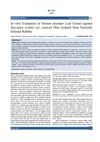
Search
for
Sort by
Research
90-120 / 143 results

research Perilla Frutescens: A Rich Source of Pharmacologically Active Compounds
Perilla frutescens, an East Asian plant, contains 400 bioactive compounds that have various health benefits, including anti-inflammatory, antidepressant, and anticancer effects, and can treat conditions like diabetes, skin allergies, and neurological disorders.

research Modeling of Chronic Radiation-Induced Cystitis in Mice
Researchers developed a mouse model that successfully mimics the bladder damage seen in humans after radiation therapy.

research Standard DNA Methylation Analysis in Mouse Epidermis: Bisulfite Sequencing, Methylation-Specific PCR, and 5-Methyl-Cytosine Immunological Detection
These methods help understand DNA changes in mouse skin.

research Besnoitiosis In Donkeys: An Emerging Parasitic Disease Of Equids In Italy
Besnoitiosis, a parasitic disease, has been found in donkeys in Italy and may be more common in Europe than previously thought.

research Lamins in Development, Tissue Maintenance, and Stress
Lamins are vital for cell survival, organ development, and preventing premature aging.

research In Vitro Evaluation of Nerium Oleander Leaf Extract Against Sarcoptes Scabiei Var. Cuniculi Mite Isolated from Naturally Infested Rabbits
Nerium oleander leaf extract effectively kills scabies mites in rabbits.

research A Case of Cronkhite-Canada Syndrome Presenting with Hematochezia
Cronkhite-Canada syndrome can cause multiple gastrointestinal polyps and various physical symptoms.

research Nanostructured Lipid Carrier for Hyperpigmentation Treatment: A Dermal Perspective
Nanostructured lipid carriers are effective for treating hyperpigmentation in women aged 30-40.

research The Effect of 5α-Reductase Inhibition With Dutasteride and Finasteride on Bone Mineral Density, Serum Lipoproteins, Hemoglobin, Prostate Specific Antigen, and Sexual Function in Healthy Young Men
Dutasteride and finasteride do not significantly affect bone density, blood fats, or blood production, but slightly lower PSA levels and minimally impact sexual function in healthy young men.
research Application of Acyzol in the Context of Zinc Deficiency and Perspectives
Acyzol could help treat conditions caused by zinc deficiency.

research Analysis of Genome DNA Methylation at Inherited Coat-Color Dilutions of Rex Rabbits
Inherited color dilution in Rex rabbits is linked to DNA methylation changes in hair follicles.

research Causal Effects of Genetically Determined Metabolites on Androgenetic Alopecia: A Two-Sample Mendelian Randomization Analysis
Certain metabolites can either protect against or increase the risk of hair loss.

research Chemical Gastroenterocolitis After Root Canal Therapy - A Case Report
A man had severe stomach issues after a dental treatment with Formacresol, which improved with a different medication.

research Multipotent Neural Crest Stem Cell-Like Cells from Rat Vibrissa Dermal Papilla Induce Neuronal Differentiation of PC12 Cells
Rat whisker cells can help turn other cells into nerve cells and might be used to treat brain injuries or diseases.

research Glucocorticoid Receptor Antagonism Improves Glucose Metabolism in a Mouse Model of Polycystic Ovary Syndrome
Blocking glucocorticoid receptors improves glucose metabolism in a PCOS mouse model.

research Gene Expression in Rat Dermal Papilla Cells: Analysis of 2529 ESTs
Rat dermal papilla cells have unique genes crucial for hair growth.

research Evolution And Genetic Architecture Of Sex-Limited Polymorphism In Cuckoos
Female cuckoo color differences are linked to their unique genes and help avoid male harassment.

research Astilbin Activates the Reactive Oxidative Species/PPARγ Pathway to Suppress Effector CD4+ T Cell Activities via Direct Binding With Cytochrome P450 1B1
Astilbin can potentially calm overactive immune responses, like in Type 1 Diabetes, by suppressing certain cell activities and reducing inflammation.
research Independent Genomewide Screens Identify the Tumor Suppressor VTRNA2-1 as a Human Epiallele Responsive to Periconceptional Environment
The environment around the time of conception can change the VTRNA2-1 gene in a way that lasts for years and may affect disease risk.

research A Previously Undescribed Cutaneous Paraneoplastic Syndrome in a Cat with Thymoma
Thymoma in cats can cause hair loss without inflammation.

research COVID-19 and Sex Differences: Mechanisms and Biomarkers
Men are more likely to have severe COVID-19 cases and fatalities than women due to factors like lifestyle, aging, and biological differences.

research New and Consolidated Therapeutic Options for Pubertal Induction in Hypogonadism: In-Depth Review of the Literature
There are various effective hormone treatments for puberty induction in boys and girls with hypogonadism, and starting treatment early is important.

research Non-Biologic Immunosuppressive Drugs for Inflammatory and Autoimmune Skin Diseases
Non-biologic immunosuppressive drugs are crucial for treating autoimmune and chronic inflammatory skin diseases.

research Iron-Deficiency Anemia During Childhood
Children need early diagnosis and treatment for iron-deficiency anemia to prevent learning problems and promote health.
research Feasibility of Repairing Full-Thickness Skin Defects by iPSC-Derived Epithelial Stem Cells Seeded on a Human Acellular Amniotic Membrane
iPSC-derived stem cells on a special membrane can help repair full-thickness skin defects.

research The Potential Utility of Tirzepatide for the Management of Polycystic Ovary Syndrome
Tirzepatide might help manage PCOS in obese patients but needs more research to confirm safety and effectiveness.
research He Shou Wu (Polygonum Multiflorum)-Induced Hepatocellular Hepatitis
Taking He Shou Wu (Polygonum multiflorum) caused liver injury in a woman using it for hair loss.

research Benefits of Testosterone Replacement and Methods of Substitution
Testosterone replacement therapy helps manage deficiency and has various methods, but requires careful monitoring to avoid side effects.

research Type 1 Diabetes Mellitus and Autoimmune Diseases: A Critical Review of the Association and the Application of Personalized Medicine
Type 1 diabetes often occurs with other autoimmune diseases, and personalized treatment based on genetics can improve outcomes.